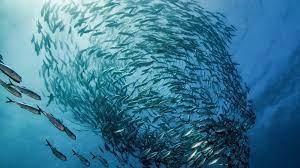General Information:
Fish represent one of the most important sources of food protein to humanity, supplying 17 percent of total animal protein consumed globally. Since 1967, global per capita fish consumption has more than doubled to 20 kg/yr/person. Nearly 40 million people obtain their jobs and livelihoods from industrial or small-scale fishing. Some 38 percent of fish caught or farmed worldwide are traded internationally. Each year, some 85 million tonnes of wild fish are harvested from the ocean and 30 million tonnes produced through marine aquaculture.
According to the UN’s Food and Agricultural Organization (FAO), 35 percent of fish stocks are considered overfished. Globally, between 11 and 26 million tonnes of annual catch are believed to derive from Illegal, Unregulated or Unreported (IUU) fishing. Harmful fisheries subsidies as high as $20 billion per year promote overfishing and the overcapitalization of fishing fleets.
Over the years, the international community has taken important steps to promote sustainable fishing, such as the FAO’s Code of Conduct on Responsible Fishing, the 1995 UN Fish Stocks Agreement, and through the work of various regional fisheries agreements and RFMOs.
Nevertheless, progress on key SDG 14 targets pertaining to sustainable fisheries has lagged and the main target, 14.4, was clearly not met in 2020.
Objectives:
Recognising the increasing urgency of addressing unsustainable fishing, the second OIC Challenge, launched in March 2021, seeks innovative solutions that address one or more of the following SDG 14 targets:
• 14.4 By 2020, end overfishing, IUU fishing and destructive fishing practices
• 14.7 By 2030, increase the economic benefits to SIDS and LDCs from the sustainable use of marine resources, including through sustainable management of fisheries (and) aquaculture
• 14.b Provide access for small scale artisanal fishers to marine resources and markets
Link with CMA Goals:
Goal I: Healthy marine and coastal ecosystems / Priority 1: Ensure the protection and sustainability of the marine ecosystem
Eligible partners:
Project proponents can include governments, private companies (including start-ups), NGO/CSO, United Nations entities, academic institutions, and intergovernmental organisations.

